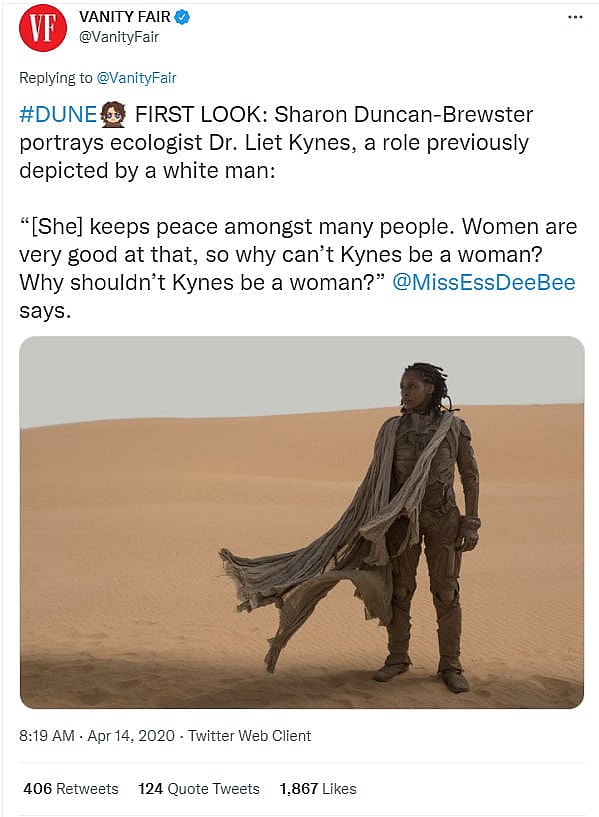Dune Screenwriter Jon Spaihts Explains Why Liet Kynes Is Race And Gender Swapped In Denis Villeneuve’s Upcoming Film

Dune screenwriter Jon Spaihts recently explained why Liet Kynes is race and gender swapped in the upcoming Dune film from director Denis Villeneuve.

Bounding Into Comics first reported that Kynes would be gender swapped back in July 2019 with our source speculating to us that Sharon Duncan-Brewster would take on the role.
Our information would be confirmed in April 2020 when Vanity Fair revealed a first look at Sharon Duncan Brewster’s Liet Kynes character.

In the original Dune novel written by Frank Herbert, Kynes is described as “tall, thin…long sandy hair, a sparse beard. The eyes were that fathomless blue-within-blue under thick brows.”
He further described the character, “His long hair and beard were mussed. The blue eyes without whites were a darkness under heavy brows.”
Herbert added, “Wisps of sandy hair protruded from it, matched by a sparse beard and thick brows. Beneath the blue-within-blue eyes, remains of a dark stain spread down to his cheeks. A matted depression across mustache and beard showed where a stillsuit tube had marked out its path.”

Now, the film’s screenplay writer Jon Spaihts has explained why he decided to gender swap the character.
Speaking with the LA Times, Spaihts stated, “Herbert’s novel is, to some extent, an artifact of its time and it definitely skews male in ways that don’t feel completely contemporary now.”
He continued, “Of all the messages in the story, the message brought by Liet Kynes of planetary stewardship, of the preciousness of resources, of the necessity of building bridges to local communities to sustain ourselves going forward — those are modern messages, and it seemed right to modernize the messenger.”
YouTuber Nerd Cookies reacted to Spaihts comments.
Related: Exclusive: Liet Kynes Death to Be Altered in Denis Villeneuve’s Dune Film
She stated, “Right off the bat, as a fan of Frank Herbert’s novels, I have to say that I completely disagree with Spaiht’s thoughts regarding Frank Herbert’s work being outdated. I’m of the opinion that most fantasy stories, like Frank Herbert’s Dune, are timeless.”
“The setting for Dune is far removed from our modern day taking place some 20,000 years into our future. It’s not presented as a utopian society,” she adds.

Later in the video, Nerd Cookies also notes, “Spaiht’s assertion that Dune is outdated is no doubt laughable to many fans of Frank Herbert’s work. In many cases, the men who serve as the leaders of the Dune universe turn out to be failures or end up becoming tyrants.”
She adds, “The women in the Dune saga are tremendously powerful as written. In fact, for much of the history before the first begins, the all-female organization of the Bene Gesserit has been carefully and secretly manipulating the powers of the universe to fulfill their clandestine agenda in the hopes to gain control over humanity.”

Specifically talking about Kynes, Nerd Cookies asserts, “I think that Spaihts comments regarding the need to modernize the messenger for these themes is short-sighted. Liet Kynes serves as the secret leader of the Fremen and is at the forefront of their efforts to transform the desert planet into a lush, green environment.”
While by itself the transformation of Arrakis in the first book might seem to be a positive development, as the series unfolds, the consequences of their actions result in a great strain on the known universe resulting in the deaths of billions.”
She also notes, “So in a way by transforming Arrakis, the Fremen are killing off the dominant indigenous species, driving it into extinction.”

Nerd Cookies further claims, “Overall the fact that Jon Spaihts thinks that he can come in and alter the author’s work to make it better, or to make it more contemporary just screams arrogance to me.
“And ultimately his assessment of the character comes off as short-sighted and lacks the nuance of the author’s work,” she asserts.

What do you make of Spaiht’s explanation for why he decided to gender swap Liet Kynes? What do you make of Nerd Cookies’ analysis of Spaiht’s explanation?
